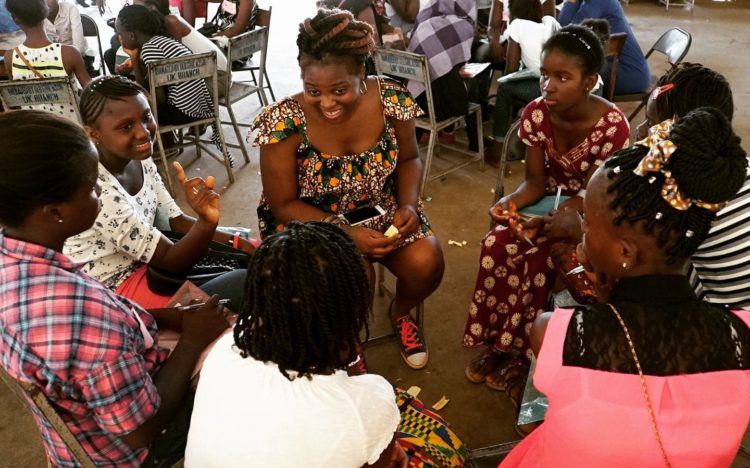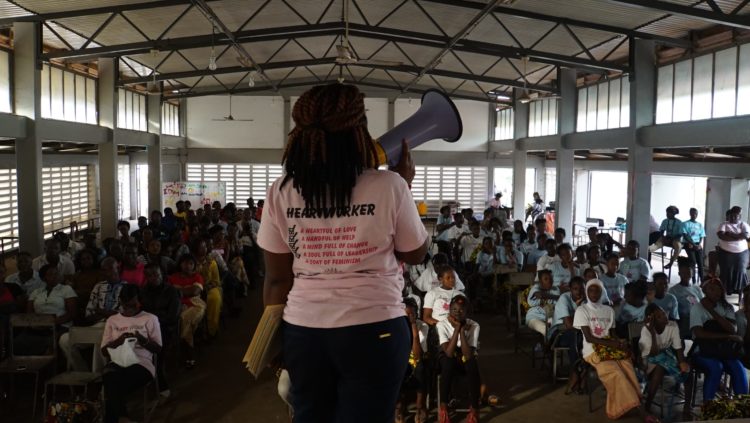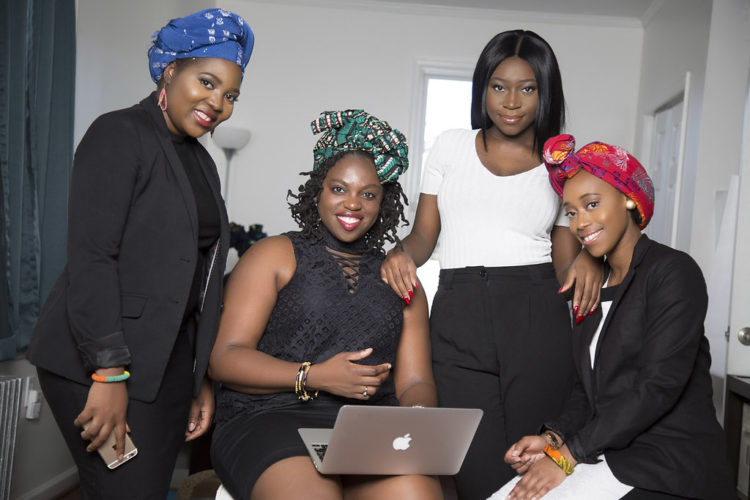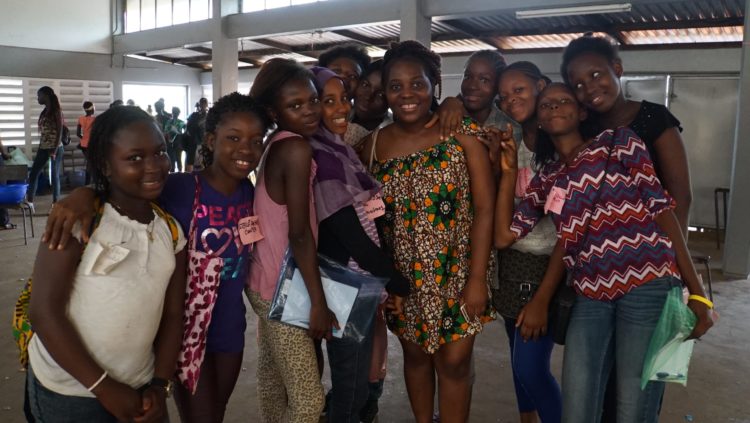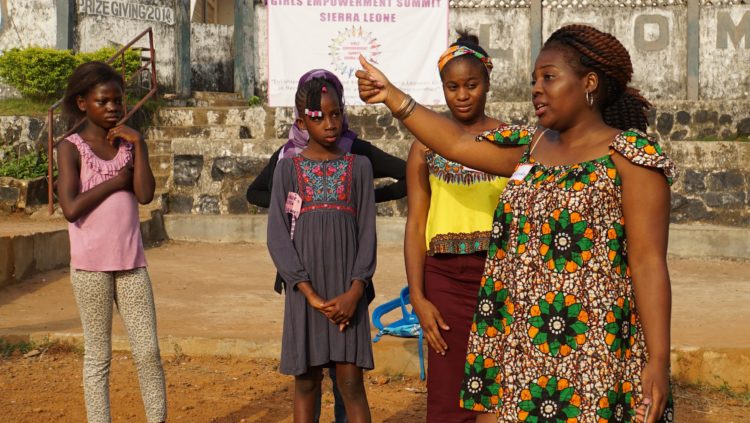These days, advocacy is viral. New #hashtag campaigns sprout regularly on Twitter; either earning global solidarity for a regional injustice and even garnering worldwide participation towards the cause.
But even after the trending dies, the case for women’s rights charges on. In communities on the African continent, the most impactful and lasting change happens at a local level, beginning with hometown impassioned leaders (suggestion: read up on how Leymah Gbowee helped end the Second Liberian Civil War).
But how to mobilise passion into action can be challenging. Social media tends to glamourise success but ignore the process to achieving that result. To get insight into growing online and offline advocacy brands we asked someone who’s done it – Moiyattu Banya, a Sierra Leonean social entrepreneur, educator, writer, feminist, and non-profit professional.
She is the founder of Girls Empowerment Summit Sierra Leone (GESSL), a social impact organisation that enhances the leadership skills of young girls through workshops and community development projects that culminate in an annual summit in Freetown, and also the founder of Women Change Africa (WCA) a media brand that curates stories of African women.
To date, WCA has curated stories for over 50 African women entrepreneurs, including Isha Johansen, the first female President of the Sierra Leone Football Association (and only the second in the world!), and for brands like African Women’s Development Fund USA and Afroelle Magazine, to only name a few.
This year, as GESSL and WCA celebrate their five-year anniversaries, she reflects on lessons – for someone starting out, thinking of giving up, and anyone in between.
Stay true to your vision and heartwork – it will always be original. My heartwork is what I define as the thing that makes my heart happy, the thing I talk about all the time and makes my eyes light up. For me it is telling the stories of everyday African women and creating spaces for women and girls to develop.
GESSL started as a pilot with nine girls and to date has enrolled over 200 girls into the organisation. I can confidently say that there aren’t organisations that are feminist in nature, have values of mentorship and sisterhood, whilst also cultivating skills for girls in Sierra Leone to develop into leaders and change agents.
I’ve learnt that when your vision is clear, the right people will attract to you but so will the wrong ones. So being mindful of who you bring around you is key but staying focused and consistent is more important. This is what happens when your heart is in something: you’re driven, you never give up, and you give it your best.
Your vision may not be 100 per cent clear but don’t sit on it and do nothing. Instead start somewhere no matter how small!
Before starting make sure your vision is informed by research. Assess the market and constituency you want to serve by hosting a focus group, survey or piloting the idea first—this is what I did with both WCA and GESSL.
Sisterhood Saturdays are for showing love to the women who hold us up. Tag a sister who builds with you in all… https://t.co/DFC1SyjpiS
— WomenChangeAfrica™️ (@WCAWorld) April 1, 2017
When I launched my media platform Women Change Africa in 2012 I had an idea I wanted a space to tell the stories of African women but that was it. I never realised WCA in itself was an intentional feminist and activist space.
I wanted to celebrate everyday women and serve as the main portal to provide inspiration for young African women entrepreneurs.
The community continues to grow, expanding as far as Suriname to Ghana. If I would have allowed perfection or fear to get in the way, I would have never launched WCA.
There is a strength in African sisterhood and I don’t take that for granted. From the women I work with to the girls that I serve, this is something I hold at my core. As a feminist, it was important for me to create a women’s only space where girls could be themselves.
In a patriarchal society as Sierra Leone where men sometimes lead in women’s spaces, GESSL goes against that rhetoric believing that girls are the change agents at the center of their own communities.
Read up on our experience at Womentoring hosted by @WCAWorld @AWDFUSA and @MoremiAfrica cc @awdf01 https://t.co/mPiJOnsyZZ pic.twitter.com/cS9nxWTq4z
— WomenChangeAfrica™️ (@WCAWorld) March 27, 2017
Working with over 100 rural women farmers in northern Sierra Leone conducting focus groups on gender equality in the region, I was reminded of the essence of community and sisterhood.
Relationships women cultivate with each other are critical and paramount.
From helping another woman to buy groceries, to supporting their fellow women through domestic disputes, there was a true sense of sisterhood amongst the women across the communities I visited.
From my experience I learnt what I have always known, that relationships women cultivate with each other are critical and paramount.
Being a social entrepreneur, activist, educator and a family woman is not an easy job. One constantly has to balance all aspects of your life. I have learnt how to say ‘No’, and how to prioritise what is important and what is not. Family holds me at my core. What centers me is knowing my source is God and I can always go to prayer when things get challenging.
I am also a strong advocate for mental health and staying balanced by taking care of our spirit
I am also a strong advocate for mental health and staying balanced by taking care of our spirit. Resting, exercising, eating well, writing and traveling are key self-care components as part of what I call Self Care Check-ins.
Read up on our experience at Womentoring hosted by @WCAWorld @AWDFUSA and @MoremiAfrica cc @awdf01 https://t.co/mPiJOnsyZZ pic.twitter.com/cS9nxWTq4z
— WomenChangeAfrica™️ (@WCAWorld) March 27, 2017
I have never been the believer of grinding till you literally get a panic attack, and this day in age it seems with this high drive to succeed we sometimes miss the mark of taking care of ourselves. Go at your own pace and listen to what feels right and stay on your path.
#DidYouKnow #GESSL provides workshops throughout the year? Here's a throwback to last year's #MenstrualHygiene and #SelfCare workshop. pic.twitter.com/HwRwzygaSg
— GESL (@GESSierraLeone) April 4, 2017
I remember during our recent summit we hosted for GESSL, myself and other mentors were leading what we call sister circles with some of the girls. At a certain point the girls asked me to share a bit about my life’s journey. I will never forget how much their eyes lit up and how their little bodies leaned in to hear me tell my story. As much as they listened I knew it was just as important to hear their stories as well. I realised in that moment that it was important to always have a two-way conversation to hear the stories of others.
For the past three years I’ve taught women and gender studies courses at Temple University in Philadelphia, USA. I always begin my classes with core values and classroom community expectations, and I begin with the concept of, “Everyone has a journey celebrate who you are!” It is important to share and celebrate your journey because you never know whose journey you may inspire and therefore help to unlock.
One of the ways I celebrate is by journaling, taking stock of my work by sharing my stories digitally and spending quality time with family and friends. The GESSL space is no different. We identify the light each girl is carrying and encourage them to celebrate whilst we dance along with them at their own beats.
This piece is dedicated to all of the women who have helped me become the woman I am today, who have come at different parts of my journey, supported me, shaped me, molded me. More specifically I dedicate this piece to my Grandma Theresa Tucker who passed away last year. Gone but you will always be with me.
This is part of a guest editorship series by Nadia Sesay. She’s producing a special feature for TRUE Africa on Sierra Leone.

